![]()
The Words The Kwak Family
|
|
The Words The Kwak Family |
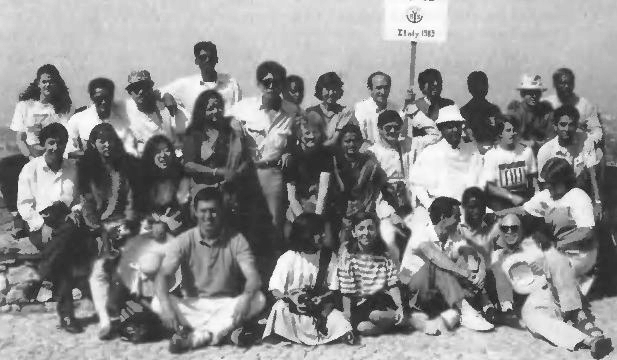
Interfaith
youth, pilgrims for peace, pause together during a prayer walk
through Assisi.
Distinguished guests, honorable directors and advisors to the Religious Youth Service, participants, ladies and gentlemen:
I welcome you to the opening of this fourth Religious Youth Service project, here in Italy. As you know, Rome is a very important city. It was once the center of one of the world's great empires, and the expression emerged that "all roads lead to Rome." Today, of course, the Roman Catholic Church has its headquarters in the Vatican, situated in Rome. In terms of their historical and religious significance, this city and this nation provide a most fitting context for the RYS.
With each passing year, the RYS project has grown and developed into a program which has dramatic importance for the world we live in. This may seem like a bold claim to make. However, I believe it is a reasonable claim, and I want to explain why I believe this.
First of all, RYS builds on the foundation of religion. The wisdom and practices of religion are affirmed as worthy of our full attention. We believe in a world that is dominated by scientific knowledge, technological advancement, and economic growth. However, despite these advancements, few fail to recognize that our world suffers from a great poverty of the spirit. The material development of our world has been most impressive. Yet, in many respects we have witnessed a certain exhaustion and even decline of the spiritual resources necessary to guide us beyond the crises of our time. Let me read to you a passage from Reverend Sun Myung Moon's speech entitled, "Dialogue and Alliance," which he delivered at the first Assembly of the World's Religions:
When we take an honest look at reality
today, we come to see that it is time not only for belief but for
action. Why do we see such serious problems including con- fusion in
value systems, moral corruption, drug addiction, terrorism, racial
discrimination, genocide, war, unjust distribution of wealth,
disregard for human rights, and totalitation communism? These vices
are the natural outcome of hedonism, atheistic materialism, and
secular humanism that denies the relevance of God. All these are the
effects of the declining faith and spiritual exhaustion of this
generation.
(1985, McAfee, New Jersey)
Spiritual ideals must guide us in our relationships to one another and in our relationship to nature. It is religion that serves to keep alive the spiritual energies so essential to the solution of today's problems.
Secondly, the significance of RYS is linked to its emphasis on being inter-religious. That is, this is not a service project composed only of Christians, or only of Hindus, or Muslims, or any other single religious tradition. Rather, participants in the RYS represent all the great religious traditions of our world. We come together to share of the great spiritual wealth which we have inherited from our forefathers and teachers. We are not seeking to subtract from one another, but only to add to one another's experience of God and the Ultimate.
As you know, religions are not free from conflict and strife. Both within and between religious communities there have been extremely destructive conflicts. I suspect that each one in this room is distinctly aware of one or more instances of profound religious intolerance or violence. Such realities do great damage to the reputations of religions, and cause many people in need of spiritual vitality to condemn religion as a cause of bigotry and violence. It is for this reason that the inter-religious dimension of RYS is so acutely important. In my mind, the coming to mutual appreciation, understanding and cooperation among the religions of the world is the very key to world peace.
Thirdly, RYS is dedicated to service. In my understanding service is the opposite of selfishness. Through service, we seek to contribute to the well-being of others. All religions have taught the ideal of service; by denying myself and giving to others the spirit grows. At the same time, religions teach that selfishness causes the spirit to decline. For in selfishness we seek to put ourselves, or our family, or our community first, even at the expense of others. We all know that selfishness often dominates economic and political ambitions. But selfishness also dominates our personal relationships and even our religious commitments.
Whenever selfishness comes to dominate a person in his or her relationships with others, that person will decline. Whenever selfishness comes to dominate in a family, society or nation, likewise, decline will follow. I am often reminded of Jesus' saying: "He who seeks to gain his life will lose it and he who seeks to lose his life will gain it." This is a simple but true teaching that I believe all religions uphold as an ideal.
The RYS upholds the religious ideal of service to others. In a world preoccupied with self, the RYS provides an opportunity to apply our energies toward the well-being of others. Only through a dedication to service can we avert the spiral of decline which the multiplication of selfishness has created in our world.
Fourth, RYS provides an adventure and vision for youth. The youth of the world represent the future. You are the world's future leaders, the generation about to inherit the positions of responsibility for directing the future course of the world. If youth is spent in selfish and self-destructive pursuits, then there remains very little hope for our world. But why do young people lose hope? I believe this is because they lack a vision for the future that takes them beyond the petty disputes and selfish goals that dominate the lives of most of the world's population today. RYS provides a vision of a world in which religious values, openness and service to others are respected; in sum, RYS offers a vision of world peace.
I want to stress here that while the RYS occurs in the context of inter-religious cooperation, these times cry out for human inter-cooperation on every level.
International cooperation and mutual support are necessary for our very survival as a humanity. This means greater exchange of mutually beneficial information, the development of natural resources, and a great and unselfish international effort in the ever more critical area of environmental protection. Without the spirit and actuality of fundamental inter-cooperation, mankind is facing a frightening destiny of certain disaster. So RYS is not only inter-religious cooperation, but the reality of international, interracial, and intercultural cooperation. In the name of the future well-being and prosperity of the whole human family, we have gathered here in Rome.
RYS, then, is not just a concept or words on a page. RYS is itself a vision in practice, or what I have called an adventure. All people, sometime in their lives, aspire to be part of a great adventure. If young people are not attracted to an adventure that leads to world peace, then they will give their attention to other adventures. Many young people take up drug adventures or sexual adventures, or money adventures; but none of these lead to world peace and elimination of suffering. The RYS is an adventure in unselfishness and spiritual growth.
You will work hard on this project. You will sweat...Not every moment will be comfortable. Also, you will be interacting with people you have never met before and whose beliefs and practices may appear strange to you. Please remember, whenever you are challenged by difficulties during the next several weeks, that you are undertaking an adventure in world peace. If you can succeed here, then indeed there is hope for our world.
In this eternal city of Rome, please plant the seeds of world peace in the soil of your own hard work and your love for one another. God bless you all.
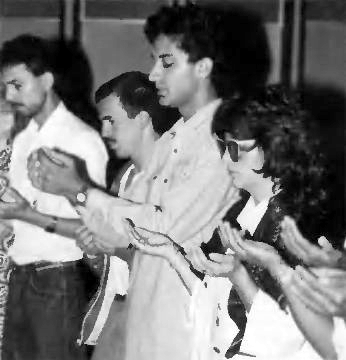
Muslim
participants share their prayer with the group.
The Religious Youth Service (RYS) is an educational and service oriented program designed to promote inter-religious and intercultural understanding and cooperative action among young people worldwide. This year's program in Italy ran from July 1-August 8 and was the fourth of a series of global projects initiated at the Assembly for the World's Religions in 1985. The RYS has previously held major yearly projects involving 120 participants in the Philippines, Portugal and Spain, and has been a catalyst for smaller projects in Kenya, India, Thailand and the United States.
A basic theme for the RYS is that inter-religious cooperation is the foundation for lasting world peace. The six week program has been divided into three sections designed to promote an environment in which participants can learn through educational programs, visitations, group dynamics, personal inter action, cooperative labor and reflection. The young people are often in situations which challenge their cultural and religious viewpoints. This challenge is designed to deepen awareness and encourage respect of the participant towards other traditions, as well as heighten the appreciation of one's own religious roots. The three weeks when participants physically labor in disadvantaged communities provides situations where lasting friendships are bonded through common work objectives. The concluding program is a five day reflective period that was held this year in the famous pilgrimage city of Assisi.
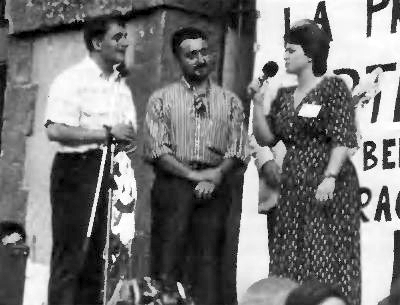
Madeline
Pretorius introducing herself to the mayor and the community of
Artena.
Madeline is currently a student at the Unification Theological Seminary.
This summer the RYS project in Italy gave young people from all over the world the opportunity to pursue and experience the fulfillment of a global vision for world peace, based on interfaith dialogue and understanding. Coming as individuals with mere dreams and ideals, everyone gathered in Rome to begin a week of orientation guided by Dr. Ron Burr and Dr. Sherry Hartman-Burr. The program was designed to facilitate the building of community and give everyone a better understanding of the 'RYS vision' and how the project is organized to achieve these goals. Being the seat of western civilization, Rome offered a wealth of historic sites to visit, to give the participants a glimpse of the once powerful Roman Empire. These included the Roman Forum, the Coliseum, Hadrian's grandiose Villa and the pre-Roman Etruscan burial ground at Cerveteri. Visits to the catacombs, St. Paul's and St. Peter's gave the participants deeper insight into the world of Christianity. Intellectual and spiritual food was provided during the week by Dr. Francis Clark, Drs. Huston and Dendra Smith, Dr. Frank DeGraeve and Monsignor Paul Vouvier, who stimulated our intellectual appetites with discussions and presentation about religious and cultural foundations of western civilization, the different religious practices and beliefs during the Roman Empire, the diversity of religious thought as well as the unity underlying humanity's religious experience.
Through the presentations by the guest speakers the question of religious unity arose. Dr. Clark suggested that unity of religions lies in the spiritual unity amongst religions. This lay within the sphere of prayer and contemplation, also including the mystical approach to divine meditation in peace. This would suggest that religions could unite in scriptural living and heart. On a normative and ethical level, value can be experienced as a spiritual experience. There is honesty of purpose and living. What needs to be acquired on a larger scale is a change in heart, an internal transformation. Dr. Huston Smith also stated that there is a movement toward the One. Thirdly, mysticism was suggested, where people value the reality that exists beyond their minds. Dr. Clark, at the conclusion of the week, explored with participants the great variety of interfaith activities that are encouraging "unity amidst diversity." RYS's activities are crucial as an ecumenical movement in a time when the relationship between the world's religions has great importance for peace. Further highlighting the orientation week was the interfaith service, which was the internal expression of the unity experienced as believers, rejoicing in our respect and appreciation for the faiths of our fellow members of RYS as representatives of all peoples, races, traditions and nations. The night prior to the departure for the various worksites the participants celebrated together, exchanging cultural entertainment of song, dance, mime and comedy, each one uniquely contributing to the feeling of global unity.
For 23 days, RYS participants labored at three separate work locations: the Oblate in Rome, Palestrina and Artena.
In the outskirts of the city of Rome, at the Roman Catholic school known as the Oblate, the RYS participants were involved in two work projects. The first project involved restoring a small building used as a storage garage into a school. New walls were constructed, old walls were repaired and painted as the two floors of the building were transformed from storage space to a school house for training poor youth in architectural skills. A second project involved constructing a large building to be used to clean and clothe the hundreds of 'street people' who come to the Sunday feeding program offered by the Catholic institution. Throughout the hot summer days under the professional guidance of an architect and masons the volunteers mixed cement, carried and laid bricks, dug foundations, and prepared roofing supports, learning new skills while accepting daily challenges.
A Franciscan monastery in the ancient mountain town of Palestrina recently offered a section of its building to FISPA, a program designed to treat alcoholics who would reside at the center during their treatment. To help this important treatment program RYS was to restore the donated wing of the building which over the centuries had become severely run down. Replacing old ceiling beams, water and electrical systems, repairing walls and building a stairway and new entrance to the wing of the convent kept the participants very busy for their full stay at Palestrina.
The third worksite was located in the town of Artena at a Franciscan monastery, where fifty Ethiopian refugees were given temporary residences. The RYS was able to construct a large building to be used to teach crafts that will help the refugees find a means to support themselves while they live at the monastery. During their stay at Artena the RYS was treated to cultural evenings by the residents and was welcomed into many of the community's I homes. Participants also had the profound experience of learning aspects of the culture and thought of the Ethiopians that joined them in work and in various shared activities.
Aside from the routine of physical work at each site the RYS program included evening educational and cultural programs that added a special balance to the schedule. Each weekend also provided the participants with an opportunity as a group to visit historic and recreational sights including Florence, Pompeii, Terni, Pisa and Naples.
The three communities in which the RYS worked welcomed them warmly and gave the participants a feeling of being deeply appreciated. This openness allowed both participants and the communities to become embraced by the spirit of selfless service which the RYS seeks to embody. This atmosphere stimulated the participants to seriously reflect upon what it meant to render service not for glory or recognition.
The bond that was created on the sites by doing physical labor side by side provided the opportunity for greater internal unity and tolerance. There could be more free expression of ideas and the sharing of religious and cultural differences. The love and friendship experienced in heart on a small international scale gave the participants the hope and vision that this could be extended onto a societal, national and even a world scale. Based upon the realization that we are all children of One God and Ultimate Being, we can develop mutual respect for each person's value, and move toward the establishment of a world culture of heart.
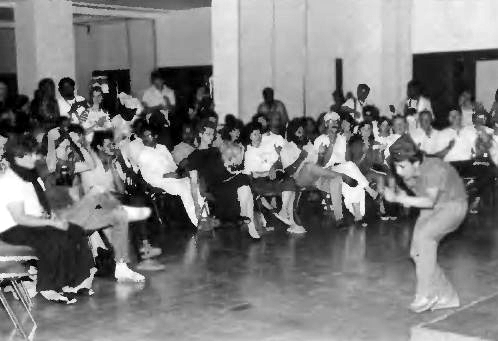
Dharmendra
Shakya from Nepal offers a Nepalese dance.
Debendra has been a participant and staff member in RYS in the Philippines, Portugal, and Italy, and is from Nepal. This was an address presented by her to other participants on August 1, 1989, in Artena, Italy.
RYS experiences have been an integral part of my life for several years now. I've learnt so much. RYS has helped me to grow, to be more open, to put into practice the teachings of my religion, to understand more about other religions, and most of all to be a better human being.
Young people from all over the world representing all major world religions gather and work together for various service projects. It is a living experience for me to find all these very different people are in fact very good and beautiful in their heart, and to find we all have basically the same concerns and vision. If all these religions can make such beautiful people, the differences in belief and approaches are not important at all.
We live together, work together, pray together and moreover, we face difficulties together and suffer together. Such moments of intense experiences lead us to feel the other persons deep in our hearts, and we find our friendships at a different level -- heart to heart, beyond intellectuality. There is a natural flow of love for each other. My experience is that as long as we don't learn to feel and understand other people in our hearts, we cannot really love other people. These heart to heart human relationships are the basic condition for love, unity and peace.
It is not only an experience of selfless love, but also an experience of receiving love from others. You receive so much from others -- participants, staff and local people. Many times we cried. The more we learned to receive and appreciate, the more we found in ourselves natural love and concern for other people.
By working together with those needy people in needy areas and seeing and feeling their lives of hardship, difficulty and suffering, I always get more inspiration and commitment to offer myself for those in need, as well as strength to face hardships and difficulties in my own life.
Having friends, brothers and sisters from all around the world is a very different experience -- almost unimaginable! I really feel like I am a part of the global family. Problems and difficulties of a country do not look any more like just their own problems. I feel they are my own problems, the problems of my dear friends in that country. Also, in times of difficulties and frustrations, to feel that you have this and that friends with the same vision is such a valuable support system among us in our journey of peace.
I learned to deal with differences from RYS. Because we work with different countries, regions and people, there are times that we suffer but we find our ways to deal with differences to achieve our common goal. I am fully convinced that differences are not a problem at all, but lack of understanding and respect is the main problem. The real need is to be able to accept and deal with differences.
RYS is a big hope for me because every year RYS gives this important, meaningful lifetime experience to young people from around the world. I always believe young people are the future, so I have great hope for a better future for humankind.
All these experiences make me realize that though RYS is a service project, building physical buildings is only one aspect, and the deeper goal is to give opportunities to deepen experiences of heart to heart human relationships, thus bringing love, unity and harmony for world peace. May RYS succeed in its noble vision!
On this occasion, I sincerely express my deepest gratitude to IRF and its founder, Rev. Sun Myung Moon, for giving me and many others this very precious opportunity of deeper experiences and realizations, and for launching many noble undertakings like RYS. May you succeed in your noble vision of unity and peace.
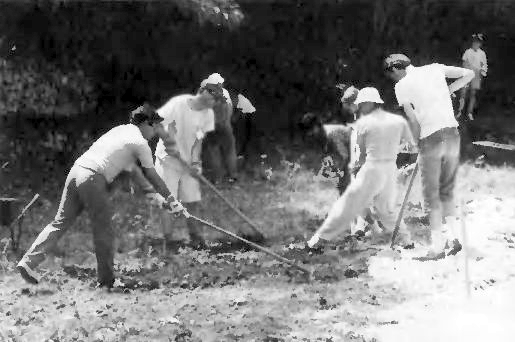
Before
the training center could be built, the ground had to be cleared.
It is amazing how God finds a way to remind me of the poor in my country. I thought that for a while it would be okay to forget the work that I do bad home in the Philippines and to have some time to be a little "selfish." But once touched, I guess one remains attached to whatever it is that has given one meaning through all of his/her life. Almost always this project makes me sensitive to the deep interrelationship we have with each other and with everything. Sometimes the effect is simply overwhelming. It becomes a profound truth that indeed human beings are human beings wherever they may come from. And that in one way or another, each one contributes to both the beauty and violence of this world.
A friend of mine puts it a bit differently, saying that our interrelationship is also manifested in our lifestyles, in that anything that one has in excess means the deprivation of someone else.
At this point I am also reminded of Dom Helde Camara saying that the real problem is not population explosion, but rather, the explosion of self- centeredness. Consequently, it becomes a scandalous reality that people go hungry when there is enough food to feed the world.
But then again, we have to ask, "Who are these poor hungry people we talk about?" I believe that before anybody can truly serve the poor, they (the poor) have to have a face. We've got to know them. The poor are not a mass of suffering, faceless people. They have names. They have hearts. They laugh, too. They are human beings like us whose humanization reflects, to a certain extent, our own dehumanization. Only by knowing who they are can we begin to love them and only then can we truly serve them.
The fact that people, especially the young, still come to realize this, is an affirmation that God is still very much present in the world. Experiencing God's hope in the young who are the wellsprings of God's spirit becomes tremendously beautiful when, even for just a moment in eternity, one forgets where he/she comes from, what creed, what race. For a moment we become human beings relating to fellow human beings, Maria relates to Manju as Maria -- not as a Christian relating to a Hindu, not as a Filipino relating to an Indian.
I believe that the mere fact that it is still possible for people to relate at this level is an affirmation of God's continuing involvement and faithfulness to humanity. No matter how different the wells we may drink from, it is the same river, the same water that nourishes our souls and gives us the spirit to make the world a better place to live in.